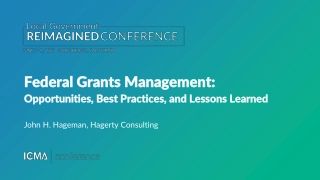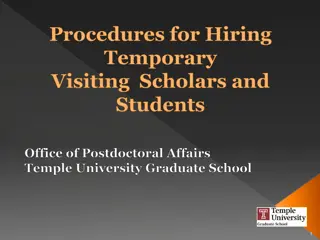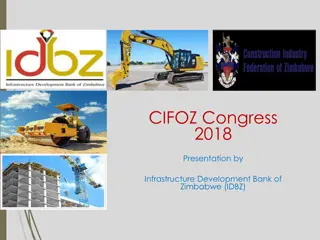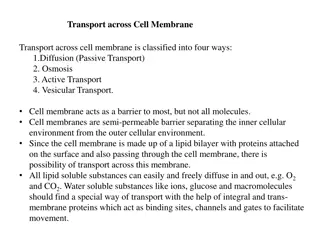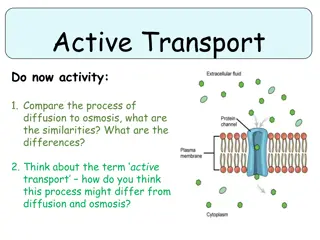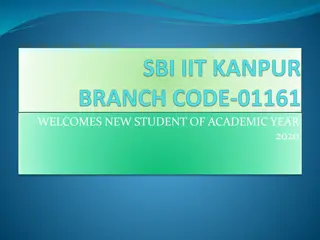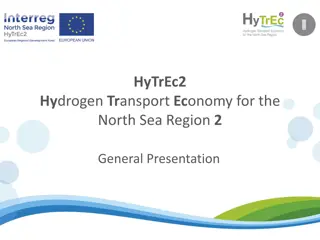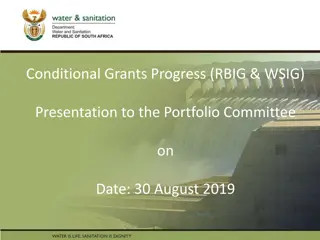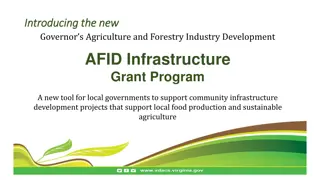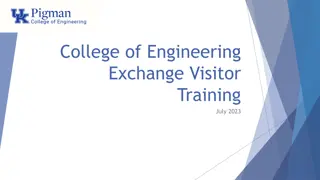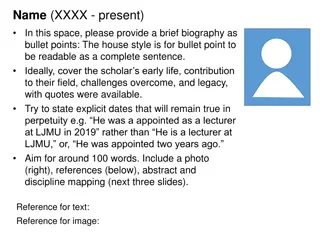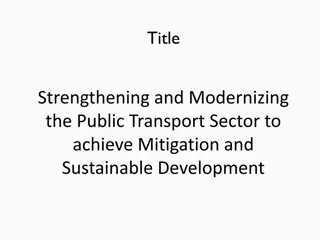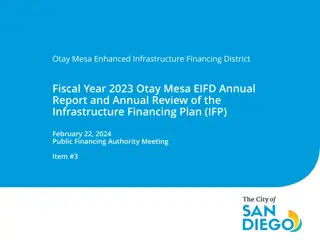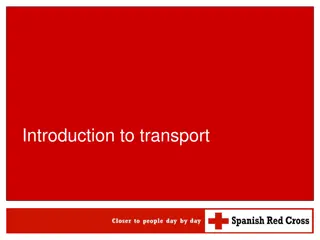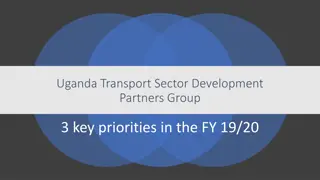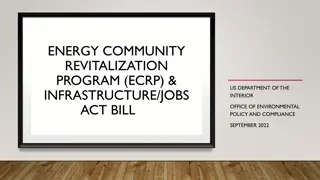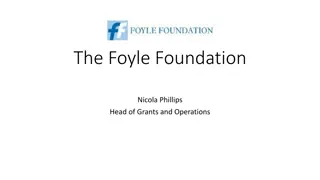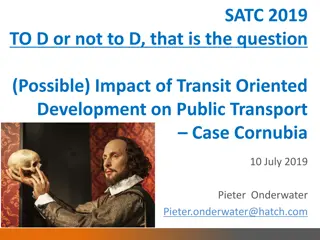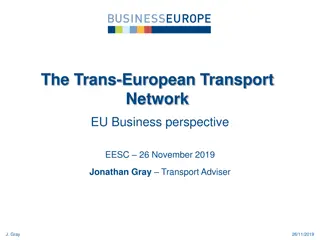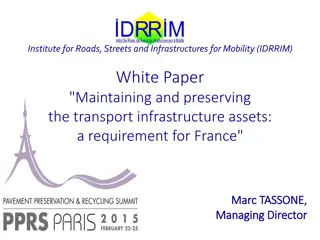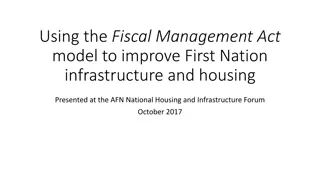Report on Infrastructure Grants and Scholar Transport Management
This report outlines the allocation and utilization of infrastructure grants to the Eastern Cape and Limpopo provinces by the National Department of Basic Education. It covers details on grant management, payment of invoices, scholar transport management, and addresses issues raised by the Standing Committee on Public Accounts. The presentation also highlights targets, deliverables, and progress in infrastructure development and educational facilities across the specified regions.
Download Presentation

Please find below an Image/Link to download the presentation.
The content on the website is provided AS IS for your information and personal use only. It may not be sold, licensed, or shared on other websites without obtaining consent from the author. Download presentation by click this link. If you encounter any issues during the download, it is possible that the publisher has removed the file from their server.
E N D
Presentation Transcript
DEPARTMENT OF BASIC EDUCATION INFRASTRUCTURE GRANT AND SCHOLAR TRANSPORT BY THE NATIONAL DEPARTMENT AND THE INFRASTRUCTURE DELIVERY PROCESS STANDING COMMITTEE ON PUBLIC ACCOUNTS 27 February 2018
PRESENTATION OUTLINE The amount of infrastructure grants given by the National Department to Eastern Cape and Limpopo provinces; Targets and deliverables and how much grants are used; Details on how the grants are managed, as well as the payment of invoices; Details on how the scholar transport is managed; and Progress on the issues that were raised by the Committee on the report that was adopted by the National Assembly. 2
PURPOSE To report to SCOPA on the Infrastructure grant and scholar transport and the infrastructure delivery process. 3
AMOUNT OF INFRASTRUCTURE GRANT TO EASTERN CAPE AND LIMPOPO 4
EIG BUDGET & EXPENDITURE FOR 2014/15 TO 2016/17 FINANCIAL YEAR Education Infrastructure Grant 2014/15 FY 2015/16 FY 2016/17 FY Expendit ure Budget R'000 Expenditure R'000 Budget R'000 Expenditure R'000 % Budget R'000 R'000 % % Spent Spent Spent Province Eastern Cape 1 177 914 904 590 76.80% 1 136 410 1 139 634 100.28% 1 614 493 1 552 637 96.17% Limpopo 940 059 93.29% 1 108 625 1 096 322 98.89% 1 035 128 1 097 338 106.01% 1 007 630 5
TARGETS AND DELIVERABLES 6
EASTERN CAPE: TARGETS & DELIVERABLES Education Infrastructure Grant 2014/15 FY 2015/16 FY 2016/17 FY Description Progress Targets Progress Targets Progress Targets New/Replacement Schools New schools 14 19 6 2 0 0 Replacements schools 4 1 12 9 13 8 Teaching spaces Number of ordinary classrooms Number of Grade R classrooms 763 45 752 69 509 84 389 116 543 33 467 20 Water Number of schools to be provided with water including upgrades 266 242 146 122 70 75 Sanitation Number of schools to be provided with sanitation including upgrades 154 180 133 136 122 101 Energy Number of schools to be provided with electricity including upgrades 87 85 104 48 103 9 Fencing Number of schools to be provided with fencing including upgrades 84 84 45 25 70 87 Maintenance Maintenance / upgrading / renovations - number of schools 29 37 48 43 88 76 7
LIMPOPO: TARGETS & DELIVERABLES Education Infrastructure Grant 2014/15 FY 2015/16 FY 2016/17 FY Description Targets Progress Targets Progress Targets Progress New/Replacement Schools New Schools 6 4 6 4 0 0 Replacements Schools 3 1 2 1 5 3 Teaching spaces Number of ordinary classrooms Number of Grade R classrooms 423 40 382 37 410 31 368 24 289 23 204 12 Water Number of schools to be provided with water including upgrades 73 67 41 38 34 26 Sanitation Number of schools to be provided with sanitation including uprades 155 180 76 61 151 149 Energy Number of schools to be provided with electricity including upgrades 93 85 9 5 43 30 Fencing Number of schools to be provided with fencing including upgrades 92 84 18 13 9 8 Maintainance Maintenance / upgrading / renovations - number of schools 40 37 31 33 51 47 8
PROGRESS - ASIDI Inappropriate Structures Province Water Sanitation Electrification EC FS GP KZN LP MP NW NC WC 139 12 248 53 171 12 200 53 0 0 14 101 75 38 10 13 19 453 2 201 94 36 58 5 45 2 0 7 372 3 5 2 1 3 5 3 25 187 Total 643 9
PROGRESS ON ASIDI (end December 2017) Scope Changes Up or Down (+/-) No Projects at Different Stages of Implementation IPMP Baseline Projects Implemented Sub-programme Projects Completed Inappropriate Structures 510 -143 367 187 180 Sanitation 741 +252 993 453 540 Water 1120 +185 1305 643 662 Electricity 916 -544 372 372 0 A total of 647 schools will be addressed under the ASIDI program as a result of mergers 10
MANAGEMENT OF THE EDUCATION INFRASTRUCTURE GRANT Strategic goal: To supplement provinces to fund the provision of education infrastructure in line with the regulations relating to minimum uniform norms and standards for public school infrastructure. Grant purpose: To help accelerate construction, maintenance, upgrading and rehabilitation of new and existing infrastructure in education including district and circuit accommodation; to enhance capacity to deliver infrastructure in education and to address achievement of the targets set out in the minimum norms and standards for school infrastructure. Outputs: *Number of new schools, additional education spaces, education support spaces and administration facilities constructed as well as equipment and furniture provided; *Number of existing schools infrastructure upgraded and rehabilitated *Number of new and existing schools maintained * Number of new special schools provided and existing special and full service schools upgraded and maintained. 12
MANAGEMENT OF THE EDUCATION INFRASTRUCTURE GRANT CONT Management of the Grant: The Infrastructure plan with prioritised project lists for the MTEF and beyond, plan must also include the implementation plans for schools affected by natural disasters ; The infrastructure programme management procurement strategy; Preventative and Corrective maintenance plan for all maintenance programmes over the MTEF period ; the capacitation strategy; the infrastructure reporting model (IRM); the national Education Infrastructure Management System; the year-end evaluation report; plan (IPMP); the Transfers to provinces: April; May; August; November and January 13
MONITORING OF THE EIG The DBE plays a monitoring and oversight role with regards to the provision of school infrastructure at a provincial level through the Education infrastructure Grant (EIG) funding. Monitoring is done through: Project site visits to assess progress, address problems and gather information. Attending Implementing Agents progress meetings with the respective provincial Education Departments (PEDs). Provides advice where possible and shares the experiences/good practices; Provides specialist advice about contract and construction management issues Monitoring deals with both programme and project matters; Programme matters include: The pattern of overall expenditure being achieved; Comparisons of expenditure to projected cash flows; Progress being made with key groups of projects [eg. Water, sanitation, libraries, laboratories, Grade R] Management of the portfolio of projects [ie evidence that the programme of projects is being managed effectively through the project cycle] 14
MONITORING OF THE EIG At the Project level: that PSP appointments are being made on time; that planning and design processes are progressing; that the tender processes for the appointment of contractors are progressing, that construction is progressing satisfactorily, [i.e. on programme, on budget, at acceptable quality ]; that projects are being handed over and closed out and that final accounts are being wrapped up that the cost of providing infrastructure is within the National Treasury Cost Norms parameters. 15
CHALLENGES Challenge Remedial Measures Delays in planning and procurement, leading to delays in getting the projects filtering to implementation The department has institutionalized the Infrastructure Delivery and Management System (IDMS), to enhance the delivery. The PEDs are capacitated with IDMS Technical Advisors to ensure that the IDMS gates are properly followed (planning the year before and implementation the following year). Overcrowding, leading to overloading of existing services Short-term: Transversal contract on the provision and relocation of mobile classrooms Long-term: The 7 year target of the Norms & Standards is to ensure that all the institutions are not faced with overcrowding (implementation is currently in progress). High cost of implementing infrastructure projects; The National Treasury has issued Cost Norms for building school infrastructure and the PEDs are in the process of revising the Prototype Drawings to be in-line the Cost Norms. Slow progress in the implementation of the capacitation of infrastructure units in provinces The DBE is engaging the Department of Public Service and Administration (DPSA) in working out market competitive remunerative strategies to ensure that the posts are attractive for experienced professionals. The sector has also considered head hunting as an alternative method. 16
CHALLENGES Challenge Remedial Measures Provincial decisions to utilize the Department of Public Work as the sole implementing agent Allowing PEDs to participate in existing framework agreements with other state organs to alleviate pressures from DPW and PEDs implement the Planned Maintenance and minor renovation projects internally to relieve the pressure of the sole implementing agent to handle capital works. Maintenance and operations are not receiving adequate funding, leading to increasing level of deterioration of existing infrastructure To improve the implementation of maintenance of the infrastructure facilities, a condition has been stipulated in the EIG framework and currently under implementation, that 20% of the total Education Infrastructure Grant (EIG) per province must be allocated to maintenance projects. Piecemeal approach in delivery of projects, leaving out some functional spaces for later implementation Implementation of school infrastructure norms and standards from a prototype point of view to standardize implementation deliverables and enforcement of the institutionalization of the IDMS to align planning and budgeting and deliver projects holistically (basic services, learning spaces, admin spaces, support spaces) . Priority matrix for delivery to be spread to as many learners as possible. As part of institutionalizing the IDMS, PEDs are required to measure capacity of all implementing agents when doing planning for delivery. Lack of capacity in implementing agents and contractors 17
HOW SCHOLAR TRANSPORT IS MANAGED AND PAYMENT OF INVOICES 18
LEARNER TRANSPORT OBJECTIVES To improve access to quality education by providing safe, decent, effective, and integrated sustainable learner transport; To improve access to quality education through a coordinated and aligned transport system; To improve planning and implementation of an integrated learner transport service; To manage and oversee the implementation of an integrated learner transport service; To ensure an effective management of learner transport system; and To provide for a safe and secure transport environment for learners through co-operation and collaboration with law enforcement authorities. 19
INSTITUTIONAL FRAMEWORK PROVINCE IMPLEMENTING DEPARTMENT Eastern Cape Transport Free State Transport Gauteng Education KwaZulu-Natal Education Limpopo Education Mpumalanga Transport Northern Cape Transport North West Transport Western Cape Education 20
INSTITUTIONAL FRAMEWORK The Policy on Learner Transport approved by Cabinet in 2015. The Policy provides for the establishment of the National Inter-Departmental Committee (NIDC) to oversee the implementation of the learner transport programme. The committee is comprised of National and Provincial Departments of Transport and education. The Committee meets on quarterly basis to receive progress on the implementation of the learner transport programme. The committee reports to the Ministers of Basic Education and Transport. The following are standard matters addressed: Progress on implementation of the policy ; Plans for learner transport per province; Learners transported quarterly per province; Budgets/financial performance per province; Accident information per quarter; Transportation of learners with disabilities; and Challenges and mitigation. 21
POLICY IMPLEMENTATION PROGRESS Action Responsibility Progress Finalise Norms/Standards and Operational Guidelines for Learner Transport Department of Transport Completed Assessment of costing and funding for policy implementation Department of Planning, Monitoring and Evaluation Part of the evaluation of the programme Development of Standardised Model Contract to guide contracting authorities Department of Transport Completed Institute National Inter-Departmental Committee (NIDC) and facilitate the provincial interdepartmental Committees Department of Transport Completed Provinces In progress Develop and implement a targeted National Learner Transport Road Safety Programme Department of Transport Provinces RTMC Monitoring of the Learner Transport Programmes Implementation DOT, DBE and provinces Ongoing 22
LEARNER TRANSPORT PROVISION 2017/18 % transported against the need Province Total need 2017/18 Target No transported Q3 % transported EC 111 406 80552 80552 100% 72% FS 9008 9008 7095 79% 79% GP 122801 110515 110515 100% 90% KZN 90 000 47747 47747 100% 53% LP 40268 37171 37171 100% 92% MP 60231 60231 60231 100% 100% NC 26877 24296 24296 100% 90% NW 54059 42421 55849 132% 103% WC 59 408 58000 59408 102% 100% TOTAL 574 058 469 941 482864 103% 84% 23
FINANCIAL PERFORMANCE 2015/16-2016/17 Budget and expenditure 2015-16 Budget and expenditure 2016/17 PROVINCE NAME Actual expenditure% Actual expenditureActual Budget allocation Actual expenditure Budget allocation expenditure% Eastern Cape R 432,000,000.00 R 435,000,000.00 R 460,706,460.13 105.91% R 450,618,478.00 104.31% Free State R 40,000,000.00 R 40,000,000.00 R 50,419,489.27 126.05% R 9,847,939.35 24.62% Gauteng R 461,000,000.00 R 535,896,000.00 R 681,216,162.56 127.12% R 461,000,000.00 100.00% Kwazulu Natal R 185,976,000.00 R 186,000,000.00 R 68,995,857.15 37.09% R 52,483,535.39 28.22% Limpopo R 141,103,000.00 R 226,691,000.00 R 218,555,692.86 96.41% R 50,555,000.00 35.83% Mpumalanga R 441,622,000.00 R 455,329,000.00 R 448,334,259.75 98.46% R 484,904,664.10 109.80% Northern Cape R 125,359,000.00 R 121,524,000.00 R 86,528,696.44 71.20% R 28,265,500.00 22.55% North West R 264,466,000.00 R 272,640,000.00 R 272,139,395.26 99.82% R 248,316,721.95 93.89% Western Cape R 270,138,000.00 R 359,755,000.00 R 329,298,018.00 91.53% R 307,514,666.00 113.84% R 2,616,194,031.42 99.37% R 2,632,835,000.00 TOTAL R 2,093,506,504.79 88.65% R 2,361,664,000.00 24
FINANCIAL PERFORMANCE Q3 % OF EXPENDITURE TO DATE PROVINCE NAME ANNUAL BUDGET 2017/18 ADJUSTED BUDGET 2017/18 EXPENDITURE TO DATE EC R 462 000 000.00 R 475 303 232.00 R 406 145 320.85 85.45% FS R 40 000 000.00 R 50 000 000.00 R 47 907 198.52 95.81% GP R 779 184 000.00 R 779 184 000.00 R 624 198 125.70 80.11% KZN R 195 000 000.00 R 195 000 000.00 R 195 734 014.20 100.38% LP R 274 223 000.00 R 274 223 000.00 R 227 421 094.35 82.93% MP R 476 914 000.00 R 476 914 000.00 R 329 872 610.99 69.17% NC R 125 310 000.00 R 125 310 000.00 R 83 151 915.68 66.36% NW R 287 100 000.00 R 287 100 000.00 R 145 572 329.51 50.70% WC R 380 047 000.00 R 351 145 000.00 R 264 394 028.00 75.29% Total R 3 019 778 000.00 R 3 014 179 232.00 R 2 324 396 637.80 77.11% 25
EVALUATION OF THE SCHOLAR TRANSPORT PROGRAMME The Standing Committee on Appropriations made the recommendations that the National Treasury in partnership with the Department of Basic Education, Department of Performance, Monitoring and Evaluation, Civil Society do an assessment of the efficacy of funding and a comprehensive evaluation of spending and implementation of the scholar transport programme be undertaken. The purpose of this evaluation is to assess the implementation of the scholar transport programme, the efficacy of the funding model and whether learners are transported safely and on time. Additionally, this evaluation should show how funding and expenditure impacts on the programme. The evaluation will encompass the mandate and reach of the Scholar Transport Implementation Programme. The data will be reviewed from 2011/12 to 2016/17 financial years. The service provider has been appointed, the steering committee has been constituted, data collection and interviews with different stakeholders is in progress and the project is expected to be completed in April 2018. 26
STAKEHOLDERS IDENTIFIED National and Provincial Transport Departments; National and Provincial Education Department; National Treasury (NT); Department of Performance Monitoring and Evaluation (DPME); Statistics South Africa (STATSA); Schools and other educational institutions; and Other bodies such as Teacher Unions, Santaco, SABOA, SACO, EE, and other NGOs. 27
KEY CHALLENGES Remedial measures Challenge Insufficient Funding of learner transport - Some provinces have provided additional funding in the 2017/18 adjustment budget . - Comprehensively evaluate the programme performance in terms of its efficacy/ efficiency and to determine funding requirements and mechanisms. The evaluation of the programme will assist in determining this. Road safety - Strengthened law enforcement efforts; increase public engagement around road safety; involve citizens in debates around road safety and leading road safety campaigns (parents, learners, schools and operators). - Implementation of Focused National Learner Transport Road Safety Programme i.t.o awareness campaigns and enforcement - DOT engaging with law enforcement agencies to address overloading and unroadworthy vehicles; - Road Safety programmes in conjunction with the Road Traffic Management Corporation; - Develop and enforce driver and learner code of conduct Rationalization of schools - Provinces are assisted to ensure integration with other programmes to ensure that a common objective is achieved as these programmes can have an effect of increasing demand for transport, which results in increasing costs and inability to provide full coverage. - A national task team to assist provinces address rationalization challenges has been set up. Infrastructure is an integral member of the committee to ensure that infrastructure matters are addressed timeously. Lack of uniformity in contracting and remuneration - Model contract documents and guidelines finalized and implemented. - The evaluation of the programme will provide solutions in terms of the appropriate remuneration model based on the performance reviews of the programme Inefficiencies in the provision of the programme - Address the transport of learners to schools of choice; - Address contracting obligations to add clause on contracting arrangement to address drop in learner numbers. 28
PROGRESS ON ISSUES RAISED BY THE COMMITTEE 29
PROGRESS ON ISSUES RAISED Topic/Issue SCOPA Decision Action Taken Progress Time-Frame Irregular Expenditure by Implementing Agents (a) Effective and regular oversight on work performed by implementing agents - DBE officials and the Programme Support Unit meets with Implementing Agents on a monthly basis to receive progress reports and address issues related to projects in implementation. Monthly accountabilility meetings are held by the Director- General with all implementing agents Regular meetings are held with the Minister, Deputy Minister and implementing agents - Project site visits to assess progress, to view problems, to gather information Monthly progress meetings with implementing agents Management of the portfolio of projects i.e. evidence that the programme of projects is being managed effectively through the project cycle Regular engagements between IA s and the Programme Support Unit Monthly DG meetings with IAs held Deputy Minister held meetings with IAs to address progress Monthly - Monthly - Monthly - - Monthly - - Monthly Quarterly - 30
PROGRESS ON ISSUES RAISED Topic/Issue SCOPA Decision Action Taken Progress Time-Frame Irregular Expenditure incurred on infrastructure (ASIDI) (b) All ongoing Internal and external investigations are expedited All the Irregular Expenditure cases have been investigated - Investigations on Irregular Expenditure cases attached as Annexure A finalised and submitted to National Treasury on 16 October 2017 for condonation. - Investigations on Irregular Expenditure cases attached as Annexure B finalised and in the process of being submitted to the DG. Awaiting Treasury response February 2018 31
PROGRESS ON ISSUES RAISED Topic/Issue SCOPA Decision Action Taken Progress Time-Frame Fruitless and Wasteful Expenditure incurred on the Kha Ri Gude programme (b) All ongoing Internal and external investigations are expedited All the Fruitless and Wasteful Expenditure cases have been investigated - Only R1.578 million of the R44 million that was declared fruitless and wasteful was confirmed to be fruitless and wasteful - Possible fruitless and wasteful expenditure is still under investigation - New cases of fruitless and wasteful expenditure cases amounting to R11.157 million was identified in 2016/17 financial year. An amount of R7.208 million has been recovered to date. Finalised March 2018 March 2018 32
PROGRESS ON ISSUES RAISED Topic/Issue SCOPA Decision Action Taken Progress Time-Frame Irregular Expenditure as well as Fruitless and Wasteful Expenditure (c) Appropriate disciplinary action is taken against employees who were responsible for incurring irregular, fruitless and wasteful expenditure as required by section 38(h) of the PFMA ongoing Internal and external investigations are expedited Warning letters were issued to the affected officials where investigations were concluded. - Regular Monitoring is carried out to ensure that similar offences do not recur. October 2016 August 2017 33
PROGRESS ON ISSUES RAISED Topic/Issue SCOPA Decision Action Taken Progress Time-Frame Met with the HAWKS on 23 June 2017. Met with Special Investigating Unit (SIU) on 21 July 2017. Met with the Asset Forfeiture Unit (AFU) 17 August 2017. Irregular Expenditure as well as Fruitless and Wasteful Expenditure (d) The Department refers this to law enforcement agencies Where applicable cases were referred to law enforcement agencies 23 June 2017 21 July 2017 17 August 2017 34
PROGRESS ON ISSUES RAISED Topic/Issue SCOPA Decision Action Taken Progress Time-Frame Irregular Expenditure as well as Fruitless and Wasteful Expenditure (e) The Department co-operates with law enforcement agencies where criminality has been established Where applicable cases were referred to law enforcement agencies - Investigations are still under-way. Ongoing Irregular Expenditure as well as Fruitless and Wasteful Expenditure The departmental SCM policy is updated encompassing all the elements of the PFMA, Treasury Regulations, PPPFA, Preferential Procurement Regulations and SCM practice notes issued by National Treasury The SCM policy was updated and signed by the Accounting Officer on 19 October 2017. - Policy updated Finalised SCM is now reporting to the CFO and the CFO is reporting to the Accounting Officer Finalised (February 2017) 35
PROGRESS ON ISSUES RAISED Topic/Issue SCOPA Decision Action Taken Progress Time-Frame Irregular Expenditure as well as Fruitless and Wasteful Expenditure (g) A proper filing system for all information supporting SCM related transaction is kept. - For goods and services procured through the Department, all the SCM related documents are available. - For procurement through implementing agents DBE officials are part of the evaluation committees of IA s and documentation for all responsive bids is submitted to DBE for verification before concurrence is granted. Documents are available for audit purposes Finalised DBE is represented in evaluation committees in all IAs that still have projects at procurement Ongoing 36
PROGRESS ON ISSUES RAISED Topic/Issue SCOPA Decision Action Taken Progress Time-Frame Irregular Expenditure as well as Fruitless and Wasteful Expenditure (h) All the directives from the executive authority must comply with the PFMA - All directives comply with the PFMA Ongoing Irregular Expenditure as well as Fruitless and Wasteful Expenditure (i) Early warning listing contracts that will soon expire be compiled and further that new tender process be entered into timeously The Department ensures that all contracts that will soon expire are renewed on time, either through a procurement process or renewal of MoAs. - Contracts are regularly reviewed Ongoing 37
RECOMMENDATION It is recommended that SCOPA discusses the Department s Report on the Infrastructure grant and scholar transport and the infrastructure delivery process. 38


